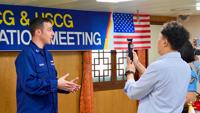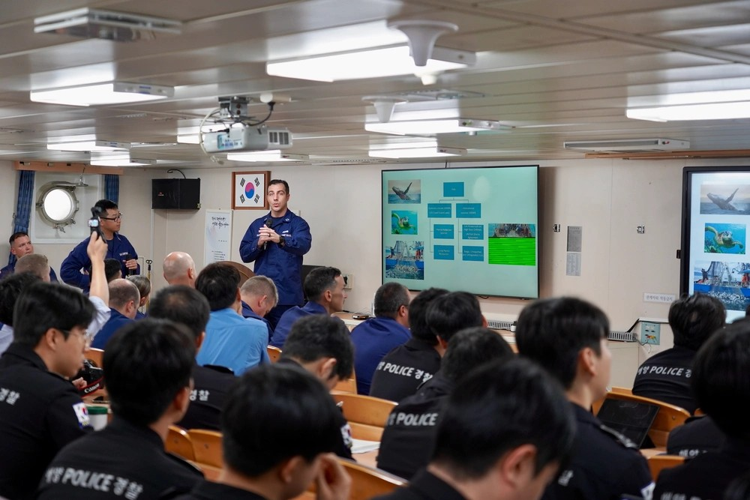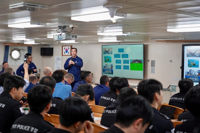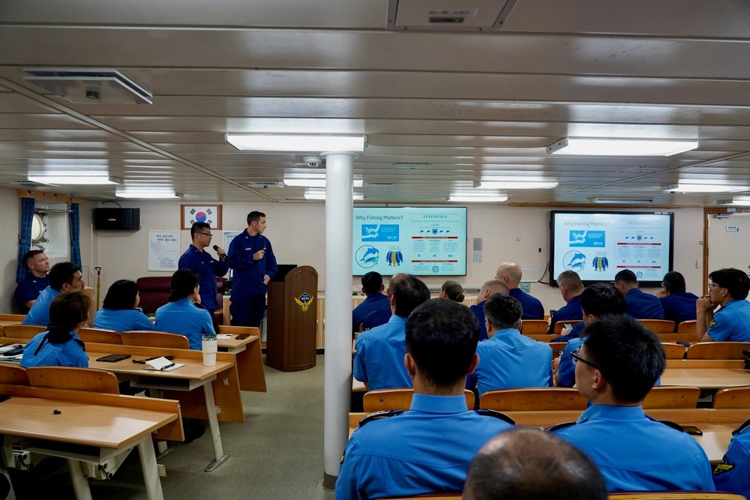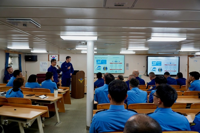The U.S. Coast Guard has established a first-of-its-kind position in Guam to tackle illegal fishing operations that threaten not only marine ecosystems across the Pacific but also intersect with broader security concerns including human trafficking.
Lt. Brian Maffucci, the inaugural Illegal, Unreported, and Unregulated Fishing operational planner at Coast Guard Forces Micronesia/Sector Guam, recently earned the prestigious Captain Quentin R. Walsh Award for his groundbreaking work in the newly created role that covers 1.9 million square nautical miles.
"His position here is fairly new. He's the first person to have it," Sara Muir, public affairs officer for U.S. Coast Guard Forces Micronesia/Sector Guam, told The Guam Daily Post. "With the expansion of operations in the Pacific and the awareness that we needed to be doing more in this region and the money that was given to us to go after things like IUU fishing, the Coast Guard identified a need to have someone focused on that issue in particular."
The creation of Maffucci's position represents a strategic shift in how the Coast Guard approaches maritime security in the Pacific, where illegal fishing operations often connect to other criminal activities.
"We frequently see a combination of illicit maritime activities, and that's why things like the Western hemisphere strategy are written in a way to acknowledge that," Muir said. "If we're doing a fisheries boarding, we're also looking to see if there's other illicit activity taking place in plain view."
Before this specialized position existed, much of the anti-IUU fishing planning was handled at higher levels in Honolulu, Pacific area commands, and Coast Guard headquarters offices. The localized approach allows for more targeted operations in waters where illegal fishing poses severe economic and environmental threats.
"We know that it's a problem and it's a problem in all of the oceans, but certainly the Pacific, because this is where the majority of the world's tuna comes from," Muir said. "It affects economies for multiple nations. Whether you're talking about the fishing industry and the impacts there, or you're talking about the food source itself that sustains millions of lives."
According to a Coast Guard press release, IUU fishing depletes fish stocks, undermines food security, and causes economic losses estimated in the billions annually. In the Pacific, where nations like Palau, the Federated States of Micronesia, and the Marshall Islands depend on fisheries for survival, illegal fishing threatens both marine life and entire communities' livelihoods.
The Point Pleasant, New Jersey, native brought extensive intelligence experience to the role, having served as an intelligence specialist, instructor, and strategic briefer. His master's degree from the National Intelligence University equipped him to tackle the complex, multinational nature of IUU fishing operations.
According to the release, one significant achievement came during operations in Palauan waters, where Maffucci coordinated with an HC-130 Hercules crew that spotted over 100 fish-aggregating devices, which are tools often used illegally to attract fish. Maffucci authorized the swift release of critical location data to Palau's government, directly enhancing its ability to protect their waters.
Working as an integrator, Maffucci has been able to coordinate with intelligence branches and other agencies to "assess the environments and identify where we think there's going to be more activity, or where there's potentially a concern and help design patrols around that," Muir said.
His role extends to building international partnerships crucial for combating illegal fishing across vast Pacific distances. The Coast Guard has developed 12 bilateral agreements with Pacific nations, ranging from the first signed with Palau in 2008 to the most recent with Papua New Guinea in 2023, said Muir.
"All of the distances that we're dealing with are pretty extreme. And a lot of our partner nations also have very small forces that are working on these issues," Muir noted, explaining why enhanced agreements now allow Coast Guard vessels to conduct boardings on behalf of partner nations without requiring their physical representatives aboard.
Maffucci also strengthened diplomatic ties through education, delivering presentations to over 75 Korea Coast Guard cadets about IUU fishing trends and U.S. strategies. He conducted a video interview on international partnerships that Korea's Coast Guard now uses as training material.
The lieutenant coordinates with regional bodies including the Western and Central Pacific Fisheries Commission and the Pacific Island Forum's Forum Fisheries Agency, which conducts four annual enforcement operations in specific areas based on anticipated fishing activity.
"He's helped design our strategies and then coordinate with those other regional coordination mechanisms," Muir said. "He's served as an integrator to make sure that our goals and our actions are aligned and we're able to help each other."
As Maffucci prepares to leave for a new assignment at a cryptologic unit in Texas, the Coast Guard will assign a new officer to continue developing this critical Pacific security role. His recognition with the Capt. Quentin R. Walsh Award, named after a Coast Guard officer whose 1930s work helped save whale populations, validates the importance of the position he helped establish.
The award, according to the release, honors exceptional contributions to Living Marine Resources and counter-IUU-F missions that are "critical to safeguarding marine ecosystems" across the Pacific region where Guam serves as a strategic hub for maritime security operations.


